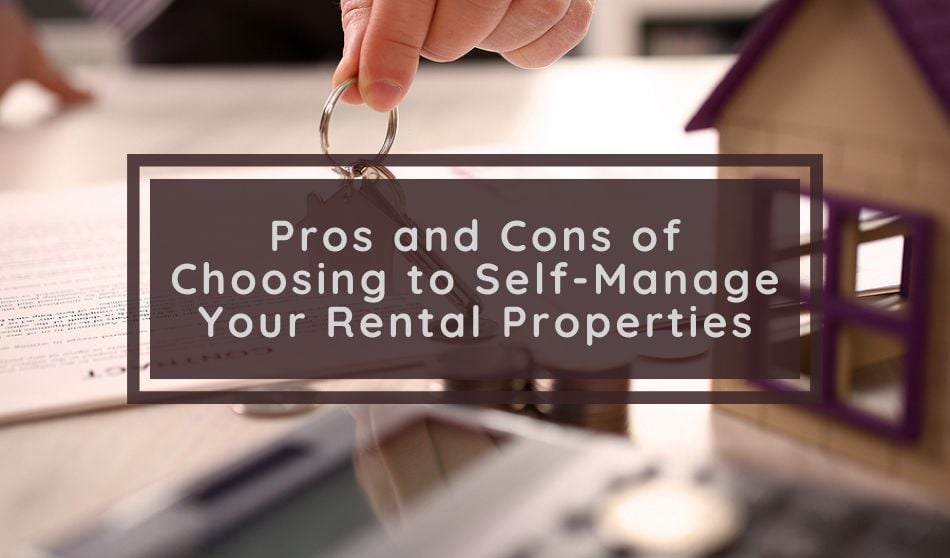
If you are a real estate investor who is choosing to self-manage your rental properties, there are some pitfalls you will need to consider. This overview of the pros and cons of self-management will help you mitigate the disadvantages of self-management while also understanding the benefits of leaving the day-to-day tasks in the hands of a trusted property management team.
Self-manging your rental properties can come with its share of challenges. However, with a savvy management strategy that takes into account factors such as financial impacts and legal requirements, self-managing your rental property can turn into a lucrative business model as you grow your portfolio.
However, as many DIY landlords know, self-managing your real estate portfolio can come with unexpected pitfalls and legal considerations that make it difficult for those who lack interest or time to deep-dive into the logistics, financials, and legal aspects of rental property management. Whether you have just one rental property or 50, there are some vital considerations to review before making the decision to manage your own portfolio or hire a property management company.
Self-Managing Your Rental Property Pros and Cons
Understanding the pros and cons of self-managed rental properties is key to making the best choice for your lifestyle, financial goals, and your portfolio.
Pros of Self-Managing Your Rental Property
While the time-intensive task of choosing to self-manage your rental properties can have its downsides, there are certainly a number of benefits to self-managing your rental property if you are the self-starting type of investor.
Lower Overhead:
Hiring a property manager can impact your overall ROI. If you’re a new landlord and margins are tight, or if you simply don’t feel comfortable paying the fees associated with a property management team, self-management may be an option that will ensure lower overhead costs long-term. If lower overhead is your goal, be sure you have shopped around for rates in your area. While fees can vary depending on your local real estate market, most property managers charge a fee that is a percentage of the monthly rent.
This monthly management fee typically falls in the range from 7-10%, and owners should double-check the management’s policy about monthly fees based on collected rent or rent due. Keep in mind there can be other overhead costs associated with hiring a manager.
These fees can include:
- On-boarding Fee
- Late Fee
- Maintenance Fee
- Lease Renewal Fee
- Eviction Fee
- Other Income Fees
Learn more: All You Need To Know About Property Management Fees
Customer Service Assurance:
In today’s hectic world, true connections, great customer service, and personalized service are harder to come by. This is even true among landlords and tenants. If you want to ensure top-of-the-line customer service for your tenants, self-managing allows you to take the landlord-tenant relationship into your own hands and gives you direct access to make sure your tenants have an amazing experience when renting at your property.
After all, great landlords can make-or-break the rental experience for their tenants, and giving your tenants a good rental experience can mitigate vacancies and grow your reputation as you attract new tenants for other rental properties in your portfolio. Self-managing your rental properties not only allows you to communicate directly with your tenants and foster that relationship, it ensures that you are the only one vetting vendors who work with your tenants.
This gives you more control over the type of vendor you hire, giving you peace of mind that the faces that represent you to your tenants are ones that align with your business and customer service goals.
Learn more: How to Communicate with Customers | Tips for Great Customer Service
Firsthand Property Insight:
While a good management team will offer insight to the state of the property, if you are a hands-on individual with a lot of maintenance experience, you may want the added security of firsthand insight on the property’s current maintenance needs and care. This can be especially helpful for those who have a background in general maintenance, electricity, or construction since they may have a higher-level understanding of property repair needs and upkeep.
Direct Control Over Tenant Screening:
Cons of Self-Managing Your Rental Property
Unfortunately for most landlords, many don’t realize the challenges that come with property management until they dive in head-first.
Don’t make that mistake; understanding the potential negatives can help you mitigate some of the pitfalls of DIY rental management.
Time Intensive:
Self-managing can be a huge time investment, especially when your portfolio is growing. While most of your time is spent while filling vacancies, there is a lot of time spent throughout the tenant lifecycle.
Self-management involves dedicating your time to activities like:
- Marketing Vacancies
- Managing listings
- Managing showings
- Collecting applications
- Tenant Screening
- Leasing and Signing
- Rent Collection and Financial Management
- Property Maintenance and Repairs
- Seasonal and routine maintenance
- Emergency maintenance
- Tenant Communication
- Turnover at the end of tenancy
Screening Risks:
Legal tenant screening can be a big sticking point when it comes to your time investment. Tenant screening should be more than simply verifying pay stubs, it should include a criminal report, eviction report, and a written tenant screening criteria that you can use to prevent unintentional discrimination or the appearance of discrimination.
Remember that state and federal laws govern fair housing, and it’s imperative to protect yourself from liability by adhering to specific legal screening standards to ensure you are protected in the event of a lawsuit. It is also important to remember that all screening reports are not equal, some will be more in-depth than others. A property management company can take the headache out of the screening process by completing it on your behalf, or you can research the best tenant screening report options to see what will best suit your needs.
Learn more: Are All Tenant Screening Reports Created Equal?
Legal Compliance Challenges:
Federal and state landlord-tenant laws are lengthy and ever-changing. In the evolving landscape of legal concerns, ignorance of the law is not an excuse that can protect you from the repercussions of accidentally breaking the law. Moreover, each municipality may have its own share of additional landlord-tenant laws that must be followed.
Staying up to date with local rental laws, handling lease agreements, and ensuring you meet general housing and property compliance requirements is a big task, and it comes with a hefty risk of liability. Proper accounting and general record-keeping are essential for taxes and any potential legal disputes, property management software or landlord software can automate this process and make it less arduous.
Need for In-Depth Market Understanding:
Understanding your local real estate market is vital for investors who seek to grow their portfolios and those who seek to self-manage their rental properties alike. That said, a good property management company and a knowledgeable broker or real estate agent can be a boon when it comes to the needed in-depth market research required to get the best ROI possible when it comes to a potential investment. If you seek to self-manage your rental property, prepare yourself to research local vacancy rates and other market conditions that will have an impact on your property’s return.





